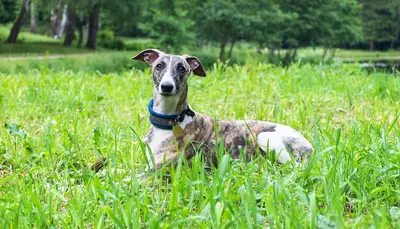German Shepherd: Breed Guide
- 21 Dec 2019
- 8m read

Tough on the outside but soft in the middle, German Shepherds are one of Britain's best-loved breeds. Employed in various lines of work, these hard workers combine brains with brawn. Whether sniffing out criminals with their police handlers, serving overseas with the armed forces, or protecting property as patrol dogs, they're real career animals. If you need further evidence of the versatility of the German Shepherd, action-hero Rin Tin Tin even has a star on the Hollywood Walk of Fame.
But it's not all work, work, work for German Shepherds – they have a goofy, playful side and an easy-going nature that makes them excellent family dogs. They're loyal to their favourite humans and thrive on a busy lifestyle that keeps their muscular bodies and laser-focused brains well exercised.
With thick bristly coats and a sturdy frame, these pups need the right food to help keep them in tip-top condition.
Based on our current customers, we estimate that adult German Shepherds need around 1,116 calories per day. This can vary based on your pooch’s age, weight and activity level.
Is an Alsatian a German Shepherd?
Simply put, an Alsatian is just another name for a German Shepherd.
So, does anyone actually know why there are two different names for the same breed of dog? As a dog food company it’s our job to be experts in this kind of random knowledge, so here goes.
These dogs were used during both WW1 and WW2 for a variety of reasons such as carrying weaponry and finding wounded soldiers. Given the situation at the time, Britain did not want to refer to this working breed as a ‘German Shepherd’, despite it being their location of origin, as it was too closely associated with their enemy. From this the name ‘Alsatian’ was coined, based on the French-German border town of Alsace-Lorraine where many battles were carried out during the war.
Fast forward a couple of decades when peace has been restored. German Shepherd breeders became discontented with the use of ‘Alsatian’ and campaigned for the original name to be restored. Typically, you will hear the name German Shepherd being used much more often now, but you may also hear Alsatian still being used.
Are German Shepherds Good with Kids?
Due to their vast intelligence and loyalty, German Shepherds are generally regarded as good family dogs.
Having said that, you should never leave children unsupervised with your pooch. Ideally, dogs that are going to be around children should be socialised from as early an age as possible. Likewise, if possible children should be taught how to approach dogs, as well as how to behave around them to minimise the risk of danger.
Larger breeds especially can pose a risk to children due to their height and weight. What might seem like a playful tug of war to your German Shepherd could be dangerous to a small child.
Do German Shepherds Shed?
Yes, German Shepherds shed their fur. A lot.
Due to their thick, double-coat, German Shepherds shed all year round, but particularly during the change of seasons to regulate their body temperature.
There are a few things you can do to minimise the effects of shedding from your German Shepherd:
• Feed your pooch a high-quality food rich in protein sources and veg
• Maintain a daily brushing schedule
• Hoover regularly
• Train your pooch to stay off the furniture / stay out of certain rooms
• Make lint rollers your best friend - they will change your entire existence for the better
When Do German Shepherds Stop Growing?
Watching your German Shepherd grow up is truly a magical experience, but you may find yourself wondering when on earth they’re going to stop getting bigger. Where did this giant teddy bear come from?
German Shepherds grow for a longer period of time than most other breeds of dog, usually reaching their full height at some point between 18 and 24 months old. But it doesn’t necessarily stop there. Brace yourself. They can continue to put on muscle mass right up until they are three years old.
It is important to be mindful of this when it comes to feeding time, with great mass comes great (feeding) responsibility. Ensure that you adjust your pooch’s diet accordingly so that they are getting the right amount of calorie intake for their weight.
How Much Exercise Do German Shepherds Need?
German Shepherds are big dogs. They're also incredibly clever and have lots of energy, so they need a good mental challenge and plenty of exercise to keep them happy. This is probably why they do so well with police and army training. You don't need to build an assault course at home or send them to boot camp, though – lots of long walks and plenty of boisterous games will do.
The amount of exercise a German Shepherd needs is dependent on lots of different factors, such as weight, age and activity level. According to the PDSA, German Shepherds require a minimum of two hours exercise per day, consisting of walks and off-lead activity.
Play time and training should be carried out on top of this to ensure plenty of mental stimulation.
It is recommended that this activity is spread out across the day, rather than all in one go, in order to keep your pooch satisfied. Not doing so could result in your pooch becoming frustrated later on in the day, leading to things like chewing up your favourite pair of trainers. Whoops.
Are German Shepherds Expensive?
According to research conducted by Pets4Homes UK as of 2022, the average cost of purchasing a German Shepherd is £1,055.
First and foremost, you should ensure that you’re buying your pup from a reputable breeder or rescue centre. This will ensure that your dog has been bred and cared for in the right circumstances. A sound woof of advice from us, if it seems too good to be true it’s likely that it is. A dog is a huge investment in time, money and love, so make sure that you take the time to do plenty of research before making any decisions.
As well as the cost to purchase a German Shepherd, it is important to be mindful of the other expenses involved when bringing a pooch into your life.
• Vaccines / flea & worming treatments- including initial and booster vaccines (usually once a year)
• Neutering / spaying- from 6 months old unless advised otherwise by your Vet)
• Equipment- collar, harness, lead, bed, bowls, brushes, washes, toys, poo bags
• Food
• Insurance
• Daycare / boarding
Butternut Box is Perfect for German Shepherds
To keep them firing on all cylinders, German Shepherds need a lot of calories every day. But there's a lot of conflicting information out there so it's hard to make an accurate calculation for your individual Arnold Pawzenegger. The one-size-fits-all guidelines on the back of some dog food might not account for the activity level or muscle-mass of your pup, making over or under-feeding a possibility.
Those big muscles need all the support they can get, which is why it's important to feed your German Shepherd a diet that's high in protein. Protein is the building block of muscles, helping to build them up or repair them after a workout. Our meals are made using human-quality meat - great news for those muscles.
Here at Butternut Box, we know that every dog is different. That's why we ask you questions about your pooch when you sign up. As well as finding out which breed you have, we also ask about their lifestyle and what sort of shape they're in. That way, we can do the complicated maths and portion up exactly the right amount of food for your dog. So there's no guesswork for you at mealtimes.
German Shepherds are often prone to food intolerances, resulting in sore and itchy skin and a dull coat. It can also cause tummy upsets, with the resulting vomiting, diarrhoea or fart attacks. These reactions can be caused by common ingredients in commercial dog foods like soy, dairy and cheap grains. At Butternut Box, we use freshly prepared ingredients, the sort you could find in your local supermarket or health-food shop, helping to eliminate any unwanted allergens.
And did we mention the taste? Rip open a Butternut pouch and watch your pup's tongue loll in anticipation. At last, meals worthy of the world's hardest-working dog.
How Much Will it Cost to Feed My German Shepherd Butternut Box?
We estimate that it will cost around £65 each month to feed your German Shepherd a diet of Butternut Box food. This is based on data from our current customers and can vary depending on things like age, weight and activity level. We generally recommend dividing this into two meals per day, morning and evening, to help sustain your pooch throughout the day.
Want an exact price and plan? Answer just a few more short questions by clicking the button below.




